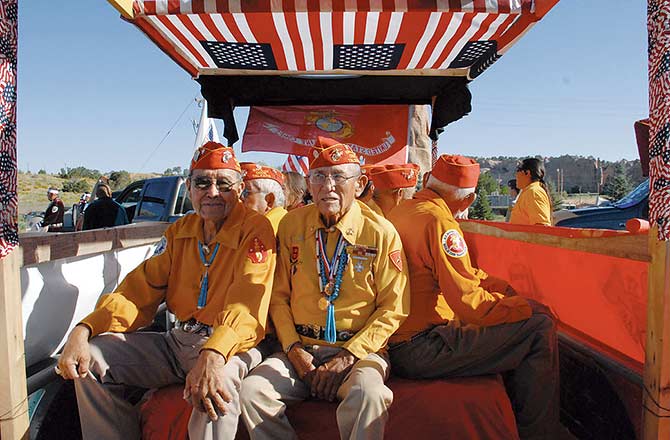U.S. code talkers day salutes a proud legacy

(Times photo - Paul Natonabah)
Code talkers Frank Chee Willeto, left and John Kinsel wait for the parade to start in the parking lot of the Navajo Nation Museum during National Navajo Code Talker Day on Aug. 14, 2008.
By Alastair Lee Bitsoi
Navajo Times
WINDOW ROCK, Aug. 13, 2011

(Times photo - Paul Natonabah)
Navajo Code Talker George Smith stands during an honor song by Native American flutist Robert Tree Cody during ceremonies marking National Navajo Code Talker Day on Aug. 14, 2008, at Veterans Memorial Park in Window Rock.
On Sunday, Aug. 14, the Navajo Code Talkers Association and Department of Navajo Veterans Affairs will celebrate the holiday and honor the brave young Navajo men who answered the call to duty and helped devise an unbreakable military code.
The code, based on the Navajo language, helped the U.S. win battle after battle as it fought to retake the eastern Pacific from the Japanese. The code talkers returned home sworn to secrecy until 1968, when the government declassified the code 23 years after the war ended.
"It's important that the accomplishment of this group of men is recognized because our language was used to change the tide of the war," said David Nez, DNVA manager. "In Navajo society, we hold our warriors in high esteem and with this group, this is their day."
On Wednesday, President Ben Shelly issued a proclamation naming Aug. 14-19 as Navajo Nation Code Talker's Week.
"In honor of National Navajo Code Talkers Day, I ask all Americans to join us in commemorating our Navajo Code Talkers, by taking a moment to pray for our war heroes and the brave military men and women who protect all our people, our freedom and our land today," Shelly said.
Wynette Arviso, who works with the code talker association, said the 2011 National Navajo Code Talkers Day honors all Native American veterans.
"These Marines were young boys when they went in and some of them lied about their ages to get in," Arviso said. "If it weren't for them, the U.S. wouldn't have won World War II. It's a fascinating story."
While historians may debate that claim, there's no dispute that the code, which made it impossible for the enemy to understand U.S. military communications, hastened the advance on the Japanese home islands.
In 1942, the Marine Corps recruited the first 29 Navajo Code Talkers. Of the original 29, only 90-year-old veteran Chester Nez remains to give a first-hand view of the development of the code.
Over the course of the war, more than 400 Navajos were trained as code talkers at a top-secret site at Camp Pendleton, Calif., and battle-ready radiomen were still being produced there when Japan surrendered in August 1945.
Some, like Nez and code talkers association President Keith Little, 87, fought in multiple battles.
Sunday's event in Window Rock will start with a flag-raising ceremony at 7:30 a.m. at Veterans Memorial Park.
The DNVA is sponsoring a Parade of Colors beginning at 9 a.m. at the Wells Fargo Bank branch and ending at the park. The parade's route will be marked and lined with flags from all 110 Navajo chapters.
DNVA's Nez said the parade is free and open to all veterans, auxiliary members, color guards, and marching units, and the wearing of uniforms is encouraged.
At approximately 10 a.m., the commemoration ceremony will begin, with flag raising, wreath laying, reading of names, and speeches.
A motorcycle honor run to raise funds for the planned code talker museum is also scheduled Sunday. Participants can start anywhere and ride to the completion point at Fire Rock Navajo Casino in Church Rock, N.M., where they are asked to chip in a minimum of $20 for single riders and $25 dollars for double riders for a chance to win a custom-made Navajo Code Talkers motorcycle.
Little said the national holiday and Shelly's proclamation are a reminder of the importance of the Navajo language and the code talker legacy in.
In contrast to other codes based on Native American languages, the Navajo Code Talkers developed a code so complex that not even other Navajos taken prisoner by the Japanese and under threat of torture could penetrate it, Little said.
"Other tribes would say, 'We have code talkers too,'" Little said. "But they're not coded, certified. We have a list of about 600 words and each of them has English vocabulary with coded Navajo names."
Little, who was assigned to the 4th Marine Division, 24 Marines Regiment 1943 to 1945, said the original 29 Navajo Code Talkers were very crafty and frustrated all listeners with their code.
"Their code was reliable and secure. It was not going to be deciphered," Little said.
To date, the association has raised about $22 million, mostly donations from the American people, to help build the planned $44 million National Navajo Code Talkers Museum and Veterans Center near Ts‚ Bonito, N.M.
"We also want to preserve our language, culture and tradition," Little added. "It's very important because the Navajo language is important to us. It helped shorten (the war) and saved countless lives."
Asked whether the Navajo language could be used again to create another unbreakable code, Little said, "I think we can do it again. The Navajo code was ingeniously devised."
Information: www.navajocodetalkers.org.

